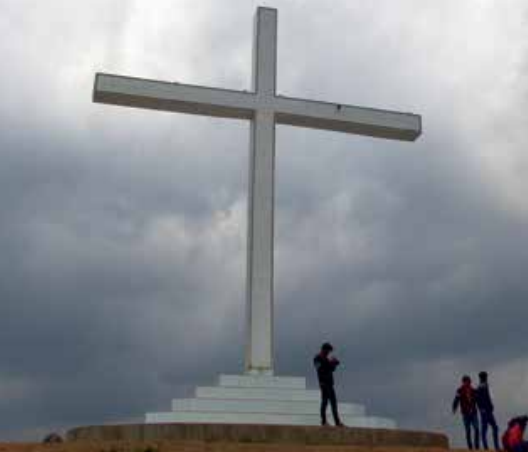Christians around Burma say they are no better off under the democratically elected government headed by Aung San Suu Kyi, despite promises made in the lead-up to the historic 2015 general election to protect the nation’s’ four major faiths, according to a report released by the United States Commission on International Religious Freedom.
The ongoing persecution of Muslims — especially the escalating violence in northern Arakan State against the Rohingya — is doubtless the country’s most well-known religious conflict, but the report’s researcher Rachel Fleming reveals Burma’s Christian minority are also still suffering at the hands of the military and local authorities that harbour religious prejudices.
Released last week, “Hidden Plight: Christian Minorities in Burma” exposes rampant assaults on the religious freedoms that Christian communities should be entitled to, particularly in isolated Chin and Kachin states and the Naga Self-Administered Zone. Since its establishment in 1999, the USCIRF has identified Burma as a country of “particular concern,” pointing the finger at Burma as one of the worst places in the world to identify with a minority religion.
According to the 2014 census, Christians make up about 6.2 percent of the population, compared with a Buddhist majority of nearly 88 percent.
The assassination of General Aung San in 1947 and the subsequent disintegration of the Panglong Agreement signalled the beginning of bleak times for non-Buddhist groups in Burma. The U Nu government formally installed Buddhism as the official state religion in 1961, and thus begun a state-sponsored portrayal of Islam and Christianity as suspicious and incompatible foreign faiths. A military coup in 1962 revoked the official status of Buddhism, but subsequent regimes continued to propagate Buddhism as the de factor state faith.
In more recent times, Fleming describes a protracted and deliberate strategy of encroachment by the military: “From the early 1990s onward, the military increased its occupation of predominantly Christian Chin, Kachin and Naga areas, destroying churches and crosses while simultaneously expanding Buddhist infrastructure such as monasteries and pagodas, at times with the use of forced labour exacted from Christians.”
The country’s slow transition to a civilian democracy has not laid to rest communal tensions. While many hoped Suu Kyi’s reputation as a human rights defender would result in tangible improvements to the lives of religious minorities, Human Rights Watch says the Nobel laureate’s National League for Democracy administration has been dangerously quiet on the matter.
“This is yet another huge disappointment on human rights from the NLD-led government, which has failed to take up many of the abuses suffered by ethnic minority groups in Burma,” said Phil Robertson, deputy director of Human Rights Watch’s Asia division.
“With their overwhelming parliamentary majority, Aung San Suu Kyi and her government should have moved quickly to revoke the Religious Conversion Law and the other three highly discriminatory ‘race and religion’ laws passed by the Thein Sein government, which would have sent a clear message to Buddhist chauvinists in the military and the civil service that the new norm would be a policy of equality of treatment of different religions.”
Rather than amending or scrapping the four controversial “race and religion” laws – which were written largely by extremist Buddhist organisation Ma-Ba-Tha, the NLD government defended the legislation at the United Nations in July, despite lawmakers from the party having in fact opposed the laws as discriminatory last year when they were members of the opposition in Parliament.
Religious freedoms violated
According to Fleming, land-grabbing, violations of the right to religious assembly and even property destruction are just some of the realities of daily life for Christian Chins in the country’s west. In 2012, the military began seizing land in Sagaing Division from 16 cemeteries, 14 of which were Christian Chin.
“Only a fraction of people were able to move their loved ones’ remains before the authorities destroyed the cemetery by bulldozer in May 2013,” reads the USCIRF report. “One Chin pastor explained, ‘Even my first-born son, I didn’t have time to move his grave.’ In early 2015, the authorities built a high school on part of the cemetery site, but the Christian community maintains it is not needed, as there is already a high school in the area. Only 30 students are attending the new school.”
Promulgation of the Buddhist faith among non-Buddhist communities has resulted in several policies that violate the religious freedoms children are entitled to under the Convention of the Rights of the Child, which Burma ratified in 1991. Between September and November, students in state schools are expected to observe Uposatha, the Buddhist sabbath.
[related]
When the sabbath falls on a weekday, classes are rescheduled for Saturdays or Sundays, forcing Christian students and their families to choose between their education and worship.
According to the report, “This practice continues in majority-Christian Naga, Chin and government-controlled Kachin areas.”
The findings have come as no surprise to the international Christian community. Despite the elevation of a Christian, ethnic Chin Henry Van Thio, to the vice presidency earlier this year, Christians face an uphill battle against unhelpful General Administrative Department personnel even to build crosses and churches in their villages.
Christian Solidarity Worldwide told DVB the ongoing struggle has been all but ignored.
“USCIRF’s report on continuing violations of freedom of religion or belief suffered by Christians in Burma is entirely consistent with evidence we have gathered and documented over many years,” Benedict Rogers, the East Asia team leader for CSW, said via email.
“Many of the issues and cases detailed in the report were sadly all too familiar to us, and illustrate how much work is still needed by the new NLD-led government in order to ensure that the basic right to freedom of religion or belief is upheld for all the peoples of Burma.
“It shines a much-needed and very welcome spotlight on this often overlooked human rights issue,” he added.



